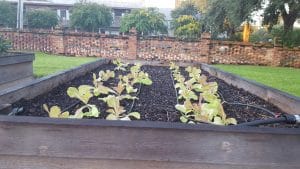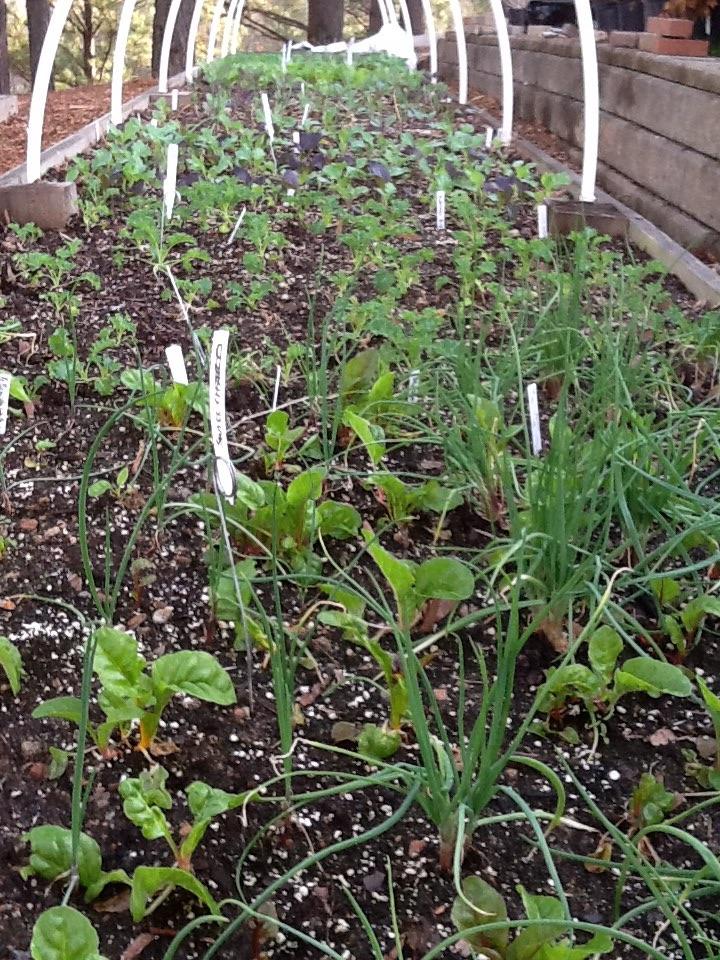Since we have had ample rainfall and moderate temperatures in Georgia, it is the perfect time to think about cool-season food gardening. We are fortunate enough to have Paul Pugliese of UGA Extension give us some tips! Paul writes….
Late January and early February are great times to plant cool-season vegetables. Many gardeners gave up on planting a fall vegetable garden last year due to the exceptional drought conditions. However, the great thing about living in Georgia is that we have a second window of opportunity in late winter to plant a number of cool-season vegetables.

Cool-season vegetables include beets, broccoli, Brussels sprouts, cabbage, carrots, collards, kale, lettuce, mustard greens, onions, English peas, Irish potatoes, radishes, spinach, Swiss chard and turnips. You can even start planting asparagus roots, asparagus is a perennial plant that takes two years to mature and start producing harvestable spears.
Most cool-season vegetables, if planted around the first week of February, will be ready to harvest around early April or May, depending on the variety. By the time you harvest these cool-season vegetables, you can turn the garden over for planting your summer vegetables at the ideal time.
Cool-season vegetables are generally very fast growing and are easily planted by direct seeding into the soil. There is no reason to purchase or grow transplants this time of year, since the soil moisture and weather conditions are ideal for seed germination. Transplants are more often used in fall planting, since it’s usually too hot and too dry in late summer or early fall for cool-season vegetables to grow from seed.
Most cool-season vegetables are medium to heavy feeders, which means they will require around 20 to 30 pounds of 10-10-10 fertilizer per 1,000 square feet of garden space. Ideally, this fertilizer should be divided into two or three applications (i.e., 10 pounds of fertilizer at planting and at four- to six-week intervals). Because most cool-season vegetables grow close to the ground and have direct contact with the soil, avoid using fertilizer sources such as animal manure that could increase the chance of contamination by foodborne pathogens.
It’s also a good idea to do a soil test to determine your soil pH and how much lime you need to apply, if any, to adjust the soil pH. (For more information about submitting samples to the University of Georgia for soil testing, call your local UGA Cooperative Extension office.)
A pH of 6.0 to 6.5 is recommended for all vegetables except Irish potatoes, which require a pH of 5.0 to 6.0. If you decide to grow Irish potatoes, dedicate a separate garden space solely to them due to their unique pH requirement.
As with all vegetables, try to select a garden site that receives at least eight to 10 hours of sunlight a day. Select a location that is conveniently located near your home and a water supply. The soil should have a good texture and be well drained. Most of the leafy greens and some of the cole crops – those in the Brassica family – can also be grown in containers due to their smaller size.
Adding a mulch of wheat straw, leaves, compost or pine straw will help conserve soil moisture, control weeds and reduce cultivation. Apply enough mulch to have 2 to 4 inches after settling. Newspaper can also be used as a mulch. Place newspapers two to three layers thick around plants. Apply 3 inches of straw or compost on top of the newspaper. Avoid using hay bales for mulch, since most hay fields are sprayed with herbicides for weed control that could carry over into your garden and kill your plants.
For more information on seeding rates, recommended varieties and row spacing, check out UGA Extension publications “Vegetable Gardening in Georgia” and “Home Gardening” online at extension.uga.edu/publications. More detailed information on home gardening potatoes, lettuce, broccoli, cauliflower, asparagus, Swiss chard, Brussels sprouts and rutabagas can also be found on the publications website.
Paul Pugliese is the ANR agent for Bartow County Cooperative Extension. He has extensive experience in vegetable gardening as he grows all types of vegetables on his farm in Cartersville, Georgia.
Happy Planting!
